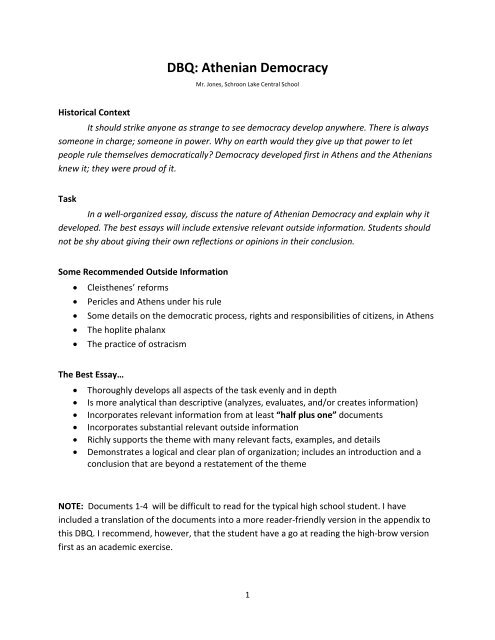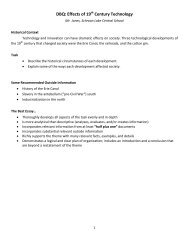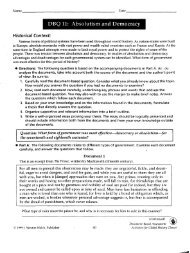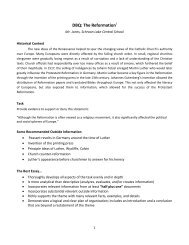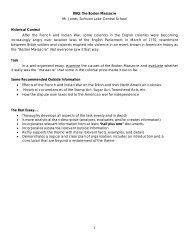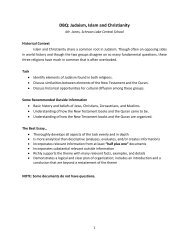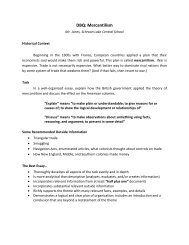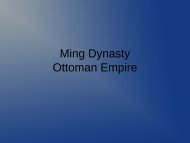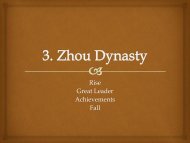DBQ Athenian Democracy
DBQ: Athenian Democracy - JonesHistory.net
DBQ: Athenian Democracy - JonesHistory.net
- No tags were found...
You also want an ePaper? Increase the reach of your titles
YUMPU automatically turns print PDFs into web optimized ePapers that Google loves.
<strong>DBQ</strong>: <strong>Athenian</strong> <strong>Democracy</strong><br />
Mr. Jones, Schroon Lake Central School<br />
Historical Context<br />
It should strike anyone as strange to see democracy develop anywhere. There is always<br />
someone in charge; someone in power. Why on earth would they give up that power to let<br />
people rule themselves democratically? <strong>Democracy</strong> developed first in Athens and the <strong>Athenian</strong>s<br />
knew it; they were proud of it.<br />
Task<br />
In a well-organized essay, discuss the nature of <strong>Athenian</strong> <strong>Democracy</strong> and explain why it<br />
developed. The best essays will include extensive relevant outside information. Students should<br />
not be shy about giving their own reflections or opinions in their conclusion.<br />
Some Recommended Outside Information<br />
• Cleisthenes’ reforms<br />
• Pericles and Athens under his rule<br />
• Some details on the democratic process, rights and responsibilities of citizens, in Athens<br />
• The hoplite phalanx<br />
• The practice of ostracism<br />
The Best Essay…<br />
• Thoroughly develops all aspects of the task evenly and in depth<br />
• Is more analytical than descriptive (analyzes, evaluates, and/or creates information)<br />
• Incorporates relevant information from at least “half plus one” documents<br />
• Incorporates substantial relevant outside information<br />
• Richly supports the theme with many relevant facts, examples, and details<br />
• Demonstrates a logical and clear plan of organization; includes an introduction and a<br />
conclusion that are beyond a restatement of the theme<br />
NOTE: Documents 1-4 will be difficult to read for the typical high school student. I have<br />
included a translation of the documents into a more reader-friendly version in the appendix to<br />
this <strong>DBQ</strong>. I recommend, however, that the student have a go at reading the high-brow version<br />
first as an academic exercise.<br />
1
Document 1<br />
Now in all states there are three elements: one class is very rich, another very poor, and a third in a<br />
mean. It is admitted that moderation and the mean are best, and therefore it will clearly be best to possess the<br />
gifts of fortune in moderation; for in that condition of life men are most ready to follow rational principle. But<br />
he who greatly excels in beauty, strength, birth, or wealth, or on the other hand who is very poor, or very weak,<br />
or very much disgraced, finds it difficult to follow rational principle. […] the middle class is least likely to shrink<br />
from rule, or to be over-ambitious for it; both of which are injuries to the state. Again, those who have too<br />
much of the goods of fortune, strength, wealth, friends, and the like, are neither willing nor able to submit to<br />
authority. […] a city ought to be composed, as far as possible, of equals and similars; and these are generally the<br />
middle classes. […] And this is the class of citizens which is most secure in a state, for they do not, like the poor,<br />
covet their neighbors' goods; nor do others covet theirs, as the poor covet the goods of the rich; and as they<br />
neither plot against others, nor are themselves plotted against, they pass through life safely. Wisely then did<br />
Phocylides pray- 'Many things are best in the mean; I desire to be of a middle condition in my city.'<br />
Aristotle: The Polis, from Politics<br />
1. According to Aristotle, who is best suited to rule?<br />
2. Why are those who “greatly excel in beauty, strength, birth, or wealth” unfit to rule?<br />
3. Why are those who are “very poor, or very weak, or very much disgraced” unfit to rule?<br />
Document 2<br />
Our constitution does not copy the laws of neighboring states; we are rather a pattern to others than<br />
imitators ourselves. Its administration favors the many instead of the few; this is why it is called a democracy. If<br />
we look to the laws, they afford equal justice to all in their private differences; if to social standing, advancement<br />
in public life falls to reputation for capacity, class considerations not being allowed to interfere with merit; nor<br />
again does poverty bar the way, if a man is able to serve the state, he is not hindered by the obscurity of his<br />
condition. The freedom which we enjoy in our government extends also to our ordinary life. […]<br />
Thucydides, The Peloponnesian War<br />
1. What does Pericles say about equality?<br />
2. What does Pericles say about freedom?<br />
2
Document 3<br />
Herodotus relates a debate on three kinds of government: monarchy, oligarchy, and democracy.<br />
[Otanes says:] [Kings] are jealous of the most virtuous among their subjects, and wish their death; while they<br />
take delight in the meanest and basest, being ever ready to listen to the tales of slanderers. A king, besides, is<br />
beyond all other men inconsistent with himself. Pay him court in moderation, and he is angry because you do<br />
not show him more profound respect--- show him profound respect, and he is offended again, because (as he<br />
says) you fawn on him. But the worst of all is, that he sets aside the laws of the land, puts men to death<br />
without trial, and subjects women to violence. The rule of the many […] is free from all those outrages which a<br />
king is wont to commit. There, places are given by lot, the magistrate is answerable for what he does, and<br />
measures rest with the commonalty. […]<br />
[Megabyzus says:] Megabyzus spoke next, and advised the setting up of an oligarchy: […] For there is<br />
nothing so void of understanding, nothing so full of wantonness, as the unwieldy rabble. It were folly not to be<br />
borne, for men, while seeking to escape the wantonness of a tyrant, to give themselves up to the wantonness<br />
of a rude unbridled mob. The tyrant, in all his doings, at least knows what is he about, but a mob is altogether<br />
devoid of knowledge; for how should there be any knowledge in a rabble, untaught, and with no natural sense<br />
of what is right and fit? […] let us choose out from the citizens a certain number of the worthiest, and put the<br />
government into their hands. For thus both we ourselves shall be among the governors, and power being<br />
entrusted to the best men, it is likely that the best counsels will prevail in the state.<br />
[Darius says:] All that Megabyzus said against democracy was well said, I think; but about oligarchy he did<br />
not speak advisedly; for take these three forms of government---democracy, oligarchy, and monarchy---and let<br />
them each be at their best, I maintain that monarchy far surpasses the other two. What government can<br />
possibly be better than that of the very best man in the whole state? […]<br />
Herodotus The Persians Reject <strong>Democracy</strong><br />
1. Why does Otanes think democracy is best?<br />
2. In what way does Megabyzus criticize democracy?<br />
3. Why does Darius think monarchy is best?<br />
3
Document 4<br />
[…] hoplites were a cause of the extension of full political participation for a major part of the <strong>Athenian</strong> citizenry<br />
in the face of aristocratic and other traditional obstacles to democratic practices. There is no reason to believe<br />
the forces of aristocratic privilege or tyrannical authority would have had to give way to democratic forces had<br />
the iron link between aristocracy and military security remained intact. While the hoplite phalanx could not<br />
guarantee the development of democracy, neither could economic change no matter how pervasive, nor political<br />
philosophy no matter how profound.<br />
Armed Forces & Society, Vol. 22, No. 1, 49-63 (1995)<br />
1. What military change helped bring about democracy?<br />
Document 5<br />
In the eighth century B.C., however, a growing number of men had become sufficiently prosperous to buy metal<br />
weapons, especially since the use of iron had made them more readily available. Presumably these new hoplites,<br />
since they paid for their own equipment and trained hard to learn phalanx tactics to defend their community, felt<br />
they, too, were entitled to political rights. According to the theory of a hoplite revolution, these new hoplite-level<br />
men forced the aristocrats to share political power by threatening to refuse to fight and thereby cripple the<br />
community's military defense.<br />
Martin, Thomas R. An Overview of Classical Greek History from Mycenae to Alexander. 25 Oct 09.<br />
http://www.perseus.tufts.edu/hopper/text?doc=Perseus%3Atext%3A1999.04.0009%3Achapter%3D5%3Asection%3D16<br />
1. Why did hoplites demand greater political power?<br />
4
Document 6<br />
"Ostracism is as follows: The Demos takes a vote […] as to whether it seemed best to hold an ostracism.<br />
When the response is positive, the Agora is fenced off with barricades; ten entrances were left open, through<br />
which they entered according to Phyle and deposited their potsherds, keeping face-down what they had<br />
written. The Nine Archons and the Boule presided. After they added up the results, whoever received the largest<br />
number, and it had to be not less than 6,000, was required to pay the penalty: he had to settle his private affairs<br />
within ten days and to depart from the City for ten years (though it later was made five years); he still received<br />
the income from his property, but he could not come nearer than Geraistos, the promontory of Euboea.<br />
Hyperbolus was the sole undistinguished person to suffer ostracism, on account of the degeneracy of his habits,<br />
not because he was suspected of aiming at tyranny. After him the practice was abandoned, which had begun<br />
when Kleisthenes was legislating, when he expelled the tyrants, so that he might toss out their friends as well.<br />
Philochorus explains Ostracism in his Book III<br />
1. What is “ostracism”?<br />
2. How is ostracism a “check and balance” in <strong>Athenian</strong> democracy?<br />
Document 7 – There are no scaffold questions for this document.<br />
Results of Cleisthenes' reforms<br />
Positive aspects<br />
* Cleisthenes' reforms were important in breaking down old allegiances and jealousies. <strong>Athenian</strong>s came to<br />
see themselves as citizens of Athens first and foremost.<br />
* The number of citizens now involved in government was considerable. Aside from engaging in the local<br />
affairs of demes and the so-called tribes, all adult males, possibly about 30 000 at this time, were members of<br />
the <strong>Athenian</strong> assembly, and 500 representatives from the 10 tribes constituted the council, where one-year<br />
terms meant an annual turnover of members. Citizens came to see themselves involved at both a local and<br />
state level.<br />
* Regardless of birth or wealth, Cleisthenes' reforms guaranteed political rights in the election of public<br />
officials.<br />
* Although there were still large landowners, the country was essentially one of free peasant farmers and, in<br />
the city, sturdily independent urban workers.<br />
* The word demokratia had not yet been invented, but the foundations had been laid.<br />
Lumb, Jerrrey. Cleisthenes’ reforms and the development of <strong>Athenian</strong> democracy. 25 Oct 09.<br />
http://www.hsc.csu.edu.au/ancient_history/historical_periods/greece/greek_world/Cleisthenes.htm<br />
5
APPENDIX<br />
In plain English…<br />
Document 1<br />
“All states have three parts: rich, poor, and middle class. The middle in anything is best, so it’s clear that<br />
it’s best to be good at being moderate. Men who are not extreme are best at being reasonable. Those who are the<br />
most beautiful, born of the best families, or rich or those who are very poor, or very weak, or really despised, all<br />
find it hard to be reasonable. The middle class will be happy to be in government but won’t want to be elected just<br />
for power. It’s bad for the state if it’s run by people who just want power. The rich and famous are not willing to<br />
take orders from others. The city should be made of mostly middle class people who are equal. This class is most<br />
secure: they aren’t jealous of other people’s achievements; they don’t plot against each other. Like Phocylides<br />
said: lots of things are best in moderation; I want to be in the middle class in my city.”<br />
Document 2<br />
“We don’t copy other countries, they copy us. We are more interested in the needs of the many over the<br />
demands of the few; that’s why it’s called a democracy. Everyone is equal under the law. It doesn’t matter what<br />
your social class is: if you are talented, you contribute. You can participate even if you’re poor. We are free in<br />
government and in our daily life outside politics.”<br />
Document 3<br />
“[Otanes says:] Kings are jealous of their good subjects and want them dead. Kings like the most disgusting<br />
people and listen to liars. A king is inconsistent with himself. Show him a little respect, and he’s mad because you<br />
were not respectful enough. Show him deep respect, and he accused you of kissing up. Worst of all, he ignores the<br />
laws, puts people to death without trial, treats women badly. The rule of the many doesn’t have these problems<br />
that kings commit. In democracy, people serve the government when their names are drawn from a hat, the<br />
judges have to answer for what they do, and must treat everyone equally.”<br />
“ [Megabyzus says:] We should have an oligarchy. Nothing is worse than the stupid mob. At least the<br />
dictator knows what he’s doing. The crowd of common people is stupid. How could they be anything else but<br />
uneducated fools? We should pick the best citizens to be our leaders.”<br />
“[Darius says:] Megabyzus is right about democracy. He’s wrong about Oligarchy, though. Of the three forms of<br />
government – democracy, oligarchy, monarchy – even on a good day, monarchy is always best because the best<br />
man in the whole state is put in charge.”<br />
Document 4<br />
“Hoplites were one reason for democracy rising against the forces of the aristocrats and of tradition. There is no<br />
reason to believe that the privileges of the aristocrats or the power of dictators would have just disappeared on its<br />
own to be replaced by democracy so long as only the aristocrats had military power. Though the hoplite phalanx<br />
could not guarantee the development of democracy, you can’t explain the development of democracy by just<br />
economic change or people having new ideas.”<br />
6


